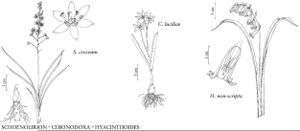Difference between revisions of "Chionodoxa luciliae"
Diagn. Pl. Orient. 1(5): 61. 1844.
FNA>Volume Importer |
imported>Volume Importer |
||
| (3 intermediate revisions by 2 users not shown) | |||
| Line 6: | Line 6: | ||
|place=1(5): 61. 1844 | |place=1(5): 61. 1844 | ||
|year=1844 | |year=1844 | ||
| + | }} | ||
| + | |special_status={{Treatment/ID/Special_status | ||
| + | |code=I | ||
| + | |label=Introduced | ||
| + | }}{{Treatment/ID/Special_status | ||
| + | |code=F | ||
| + | |label=Illustrated | ||
}} | }} | ||
|basionyms= | |basionyms= | ||
| Line 11: | Line 18: | ||
|name=Scilla luciliae | |name=Scilla luciliae | ||
|authority=(Boissier) Speta | |authority=(Boissier) Speta | ||
| + | |rank=species | ||
}} | }} | ||
|hierarchy=Liliaceae;Chionodoxa;Chionodoxa luciliae | |hierarchy=Liliaceae;Chionodoxa;Chionodoxa luciliae | ||
| Line 26: | Line 34: | ||
|elevation=[1600–2000 m in Turkey] | |elevation=[1600–2000 m in Turkey] | ||
|distribution=Mass.;Mich.;Utah;Europe (w Turkey). | |distribution=Mass.;Mich.;Utah;Europe (w Turkey). | ||
| + | |introduced=true | ||
|discussion=<p>Chinodoxa luciliae, a spring-blooming, garden species, has been reported established on lawns in Houghton and Borrago counties, Michigan (E. G. Voss 1972–1985, vol. 1). Because C. forbesii Baker, distinguished by its taller scapes (to 30 cm), with more numerous (4–10), slightly larger, and slightly pendent flowers, is more widely cultivated, often as “<i>C. luciliae</i>,” both it and <i>C. luciliae</i> are expected to be naturalized elsewhere.</p> | |discussion=<p>Chinodoxa luciliae, a spring-blooming, garden species, has been reported established on lawns in Houghton and Borrago counties, Michigan (E. G. Voss 1972–1985, vol. 1). Because C. forbesii Baker, distinguished by its taller scapes (to 30 cm), with more numerous (4–10), slightly larger, and slightly pendent flowers, is more widely cultivated, often as “<i>C. luciliae</i>,” both it and <i>C. luciliae</i> are expected to be naturalized elsewhere.</p> | ||
|tables= | |tables= | ||
| Line 35: | Line 44: | ||
-->{{#Taxon: | -->{{#Taxon: | ||
name=Chionodoxa luciliae | name=Chionodoxa luciliae | ||
| − | |||
|authority=Boissier | |authority=Boissier | ||
|rank=species | |rank=species | ||
| Line 50: | Line 58: | ||
|publication title=Diagn. Pl. Orient. | |publication title=Diagn. Pl. Orient. | ||
|publication year=1844 | |publication year=1844 | ||
| − | |special status= | + | |special status=Introduced;Illustrated |
| − | |source xml=https:// | + | |source xml=https://bitbucket.org/aafc-mbb/fna-data-curation/src/2e0870ddd59836b60bcf96646a41e87ea5a5943a/coarse_grained_fna_xml/V26/V26_628.xml |
|genus=Chionodoxa | |genus=Chionodoxa | ||
|species=Chionodoxa luciliae | |species=Chionodoxa luciliae | ||
Latest revision as of 22:16, 5 November 2020
Plants 10–20 cm; bulbs ovoid, 1.5–2 cm. Leaves 2–4, often recurved, broadly linear, 7–20 × 1–2 cm. Scapes usually solitary. Inflorescences 1–2-flowered. Flowers: perianth deep blue with white central zone, tube 2.5–4 mm; tepals 12–15(–20) mm; filaments white; pedicel erect, equaling or shorter than perianth. Capsules ± globose, 4–6 mm. Seeds with white appendages. 2n = 18.
Phenology: Flowering early to mid spring.
Habitat: Lawns, open mesic areas
Elevation: [1600–2000 m in Turkey]
Distribution
Introduced; Mass., Mich., Utah, Europe (w Turkey).
Discussion
Chinodoxa luciliae, a spring-blooming, garden species, has been reported established on lawns in Houghton and Borrago counties, Michigan (E. G. Voss 1972–1985, vol. 1). Because C. forbesii Baker, distinguished by its taller scapes (to 30 cm), with more numerous (4–10), slightly larger, and slightly pendent flowers, is more widely cultivated, often as “C. luciliae,” both it and C. luciliae are expected to be naturalized elsewhere.
Selected References
None.
